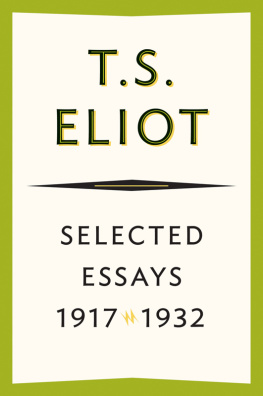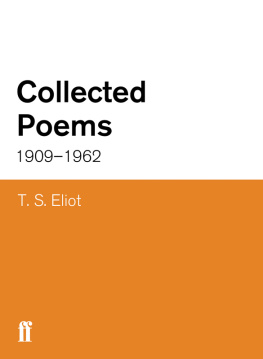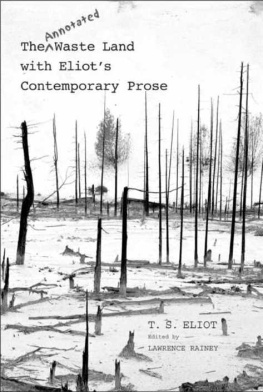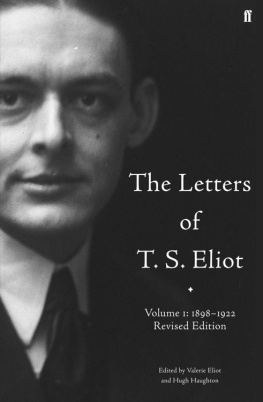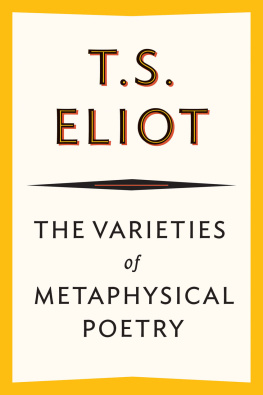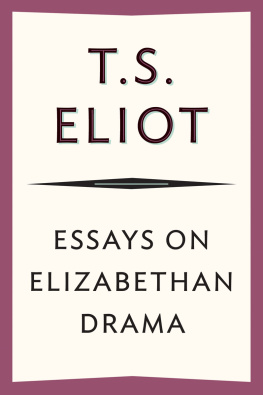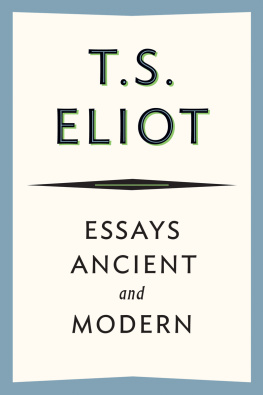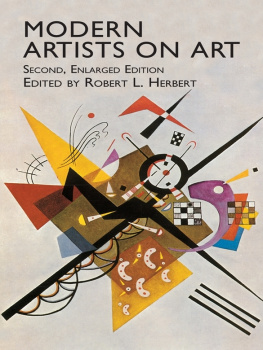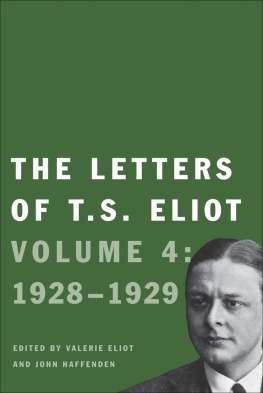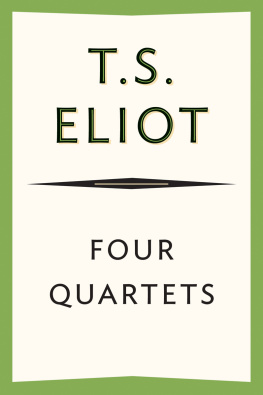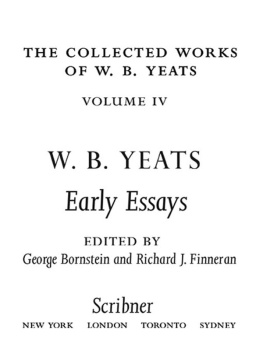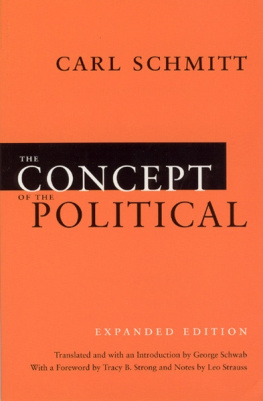T. S. Eliot - Selected Essays 1917-1932
Here you can read online T. S. Eliot - Selected Essays 1917-1932 full text of the book (entire story) in english for free. Download pdf and epub, get meaning, cover and reviews about this ebook. year: 1950, publisher: Houghton Mifflin Harcourt, genre: Science. Description of the work, (preface) as well as reviews are available. Best literature library LitArk.com created for fans of good reading and offers a wide selection of genres:
Romance novel
Science fiction
Adventure
Detective
Science
History
Home and family
Prose
Art
Politics
Computer
Non-fiction
Religion
Business
Children
Humor
Choose a favorite category and find really read worthwhile books. Enjoy immersion in the world of imagination, feel the emotions of the characters or learn something new for yourself, make an fascinating discovery.
Selected Essays 1917-1932: summary, description and annotation
We offer to read an annotation, description, summary or preface (depends on what the author of the book "Selected Essays 1917-1932" wrote himself). If you haven't found the necessary information about the book — write in the comments, we will try to find it.
An expanded edition of the most significant works of criticism from a Nobel laureate and one of the greatest minds of the modern era.
Selected Essays 1917-1932 — read online for free the complete book (whole text) full work
Below is the text of the book, divided by pages. System saving the place of the last page read, allows you to conveniently read the book "Selected Essays 1917-1932" online for free, without having to search again every time where you left off. Put a bookmark, and you can go to the page where you finished reading at any time.
Font size:
Interval:
Bookmark:
Copyright, 1932, by
Harcourt, Brace and Company, Inc.
All rights reserved. No part of this publication may be reproduced or transmitted in any form or by any means, electronic or mechanical, including photocopy, recording, or any information storage and retrieval system, without permission in writing from the publisher.
For information about permission to reproduce selections from this book, write to Permissions, Houghton Mifflin Harcourt Publishing Company, 215 Park Avenue South, New York, New York 10003.
www.hmhco.com
Library of Congress Cataloging-in-Publication Data is available.
e ISBN 978-0-547-54379-6
v1.0314
TO
Harriet Shaw Weaver
IN GRATITUDE ,
AND IN RECOGNITION OF HER SERVICES
TO ENGLISH LETTERS
M Y ACKNOWLEDGMENTS are due to Messrs. Methuen & Co. Ltd. and Alfred A. Knopf, Inc. (for the parts of The Sacred Wood, reprinted); to Messrs. Doubleday, Doran & Co. (for essays reprinted from For Lancelot Andrewes); to The Hogarth Press (Homage to John Dryden); to The Haslewood Press (for A Dialogue on Dramatic Poetry); to Messrs. Constable & Co. Ltd. (for Seneca in Elizabethan Translation, originally printed as Introduction to the Tudor Translations Series edition of the Tenne Tragedies); to the Shakespeare Association and the Oxford University Press (Shakespeare and the Senecan Tradition); to Mr. Walter de la Mare and the Royal Society of Literature (Arnold and Pater); to The Blackamore Press(Baudelaire); to the English Association (Charles Whibley). Also to The Egoist, The Athenaeum, The Times Literary Supplement, Art and Letters, The Hound and Horn, The Bookman, and The Criterion, in which most of these papers originally appeared.
My thanks are also due to Mr. B. L. Richmond, without whose suggestions and encouragement the essays on Elizabethan dramatists would not have been written; and to Mr. F. V. Morley for his assistance in selecting the essays and in reading the proofs, and for his pertinacity in harrying me to do what work I have myself done in preparation of this volume.
T. S. E.
London: April, 1932.
I N English writing we seldom speak of tradition, though we occasionally apply its name in deploring its absence. We cannot refer to the tradition or to a tradition; at most, we employ the adjective in saying that the poetry of So-and-so is traditional or even too traditional. Seldom, perhaps, does the word appear except in a phrase of censure. If otherwise, it is vaguely approbative, with the implication, as to the work approved, of some pleasing archaeological reconstruction. You can hardly make the word agreeable to English ears without this comfortable reference to the reassuring science of archaeology.
Certainly the word is not likely to appear in our appreciations of living or dead writers. Every nation, every race, has not only its own creative, but its own critical turn of mind; and is even more oblivious of the shortcomings and limitations of its critical habits than of those of its creative genius. We know, or think we know, from the enormous mass of critical writing that has appeared in the French language the critical method or habit of the French; we only conclude (we are such unconscious people) that the French are more critical than we, and sometimes even plume ourselves a little with the fact, as if the French were the less spontaneous. Perhaps they are; but we might remind ourselves that criticism is as inevitable as breathing, and that we should be none the worse for articulating what passes in our minds when we read a book and feel an emotion about it, for criticizing our own minds in their work of criticism. One of the facts that might come to light in this process is our tendency to insist, when we praise a poet, upon those aspects of his work in which he least resembles any one else. In these aspects or parts of his work we pretend to find what is individual, what is the peculiar essence of the man. We dwell with satisfaction upon the poets difference from his predecessors, especially his immediate predecessors; we endeavour to find something that can be isolated in order to be enjoyed. Whereas if we approach a poet without this prejudice we shall often find that not only the best, but the most individual parts of his work may be those in which the dead poets, his ancestors, assert their immortality most vigorously. And I do not mean the impressionable period of adolescence, but the period of full maturity.
Yet if the only form of tradition, of handing down, consisted in following the ways of the immediate generation before us in a blind or timid adherence to its successes, tradition should positively be discouraged. We have seen many such simple currents soon lost in the sand; and novelty is better than repetition. Tradition is a matter of much wider significance. It cannot be inherited, and if you want it you must obtain it by great labour. It involves, in the first place, the historical sense, which we may call nearly indispensable to any one who would continue to be a poet beyond his twenty-fifth year; and the historical sense involves a perception, not only of the pastness of the past, but of its presence; the historical sense compels a man to write not merely with his own generation in his bones, but with a feeling that the whole of the literature of Europe from Homer and within it the whole of the literature of his own country has a simultaneous existence and composes a simultaneous order. This historical sense, which is a sense of the timeless as well as of the temporal and of the timeless and of the temporal together, is what makes a writer traditional. And it is at the same time what makes a writer most acutely conscious of his place in time, of his own contemporaneity.
No poet, no artist of any art, has his complete meaning alone. His significance, his appreciation is the appreciation of his relation to the dead poets and artists. You cannot value him alone; you must set him, for contrast and comparison, among the dead. I mean this as a principle of aesthetic, not merely historical, criticism. The necessity that he shall conform, that he shall cohere, is not onesided; what happens when a new work of art is created is something that happens simultaneously to all the works of art which preceded it. The existing monuments form an ideal order among themselves, which is modified by the introduction of the new (the really new) work of art among them. The existing order is complete before the new work arrives; for order to persist after the supervention of novelty, the whole existing order must be, if ever so slightly, altered; and so the relations, proportions, values of each work of art toward the whole are readjusted; and this is conformity between the old and the new. Whoever has approved this idea of order, of the form of European, of English literature will not find it preposterous that the past should be altered by the present as much as the present is directed by the past. And the poet who is aware of this will be aware of great difficulties and responsibilities.
In a peculiar sense he will be aware also that he must inevitably be judged by the standards of the past. I say judged, not amputated, by them; not judged to be as good as, or worse or better than, the dead; and certainly not judged by the canons of dead critics. It is a judgment, a comparison, in which two things are measured by each other. To conform merely would be for the new work not really to conform at all; it would not be new, and would therefore not be a work of art. And we do not quite say that the new is more valuable because it fits in; but its fitting in is a test of its valuea test, it is true, which can only be slowly and cautiously applied, for we are none of us infallible judges of conformity. We say: it appears to conform, and is perhaps individual, or it appears individual, and many conform; but we are hardly likely to find that it is one and not the other.
Next pageFont size:
Interval:
Bookmark:
Similar books «Selected Essays 1917-1932»
Look at similar books to Selected Essays 1917-1932. We have selected literature similar in name and meaning in the hope of providing readers with more options to find new, interesting, not yet read works.
Discussion, reviews of the book Selected Essays 1917-1932 and just readers' own opinions. Leave your comments, write what you think about the work, its meaning or the main characters. Specify what exactly you liked and what you didn't like, and why you think so.

